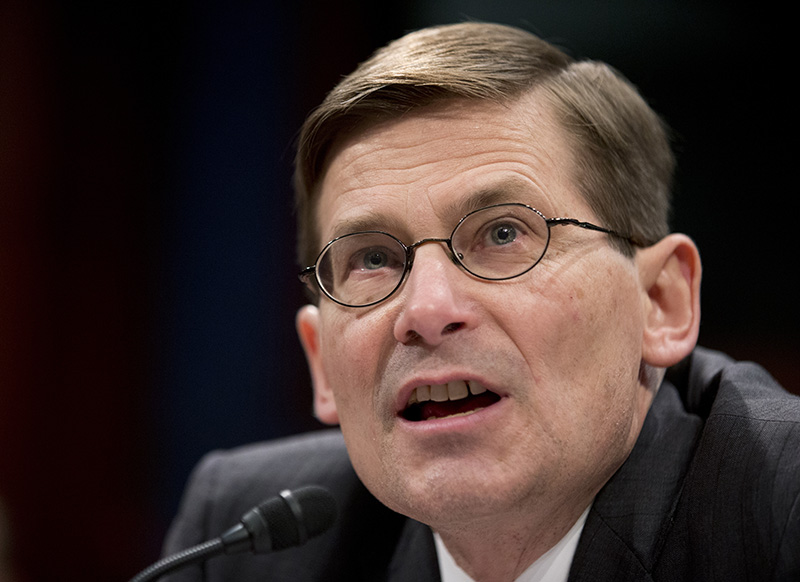WASHINGTON — Chelsea Manning, an Army veteran who spent seven years in prison for leaking classified government secrets, will join Harvard’s Kennedy School this fall as a visiting fellow at the Institute of Politics, an announcement that’s generated escalating backlash from within the intelligence community and beyond.
Calling Manning “a traitor,” CIA Director Mike Pompeo on Thursday canceled his participation in the school’s John F. Kennedy Jr. Forum.
In a letter to organizers, Pompeo, who holds a law degree from Harvard, said Manning “stands against everything the brave men and women I serve alongside stand for.”
Earlier Thursday, in a stern five-paragraph letter of his own, Michael Morell, a former acting CIA director who spent more than three decades at the agency, resigned from Harvard’s Belfer Center for Science and International Affairs, where he’d been a fellow since September 2013. The school’s invitation to Manning all but endorses her decision to break the law, he said.
“The Kennedy School’s decision will assist Ms. Manning in her long-standing effort to legitimize the criminal path that she took to prominence, an attempt that may encourage others to leak classified information as well,” Morell’s letter said. “I have an obligation to my conscience – and I believe to the country – to stand up against any efforts to justify leaks of sensitive national security information.”
Morell, 59, twice served as the CIA’s acting director, retiring in 2013 as the agency’s No. 2.
Manning, 29, is transgender. As an Army intelligence analyst named Bradley Manning, she was convicted of espionage and sentenced to 35 years in prison for providing thousands of classified documents to Wikileaks, which Pompeo and Morell characterized as “an adversarial foreign intelligence service.”
Supporters of the site’s founder, Julian Assange, consider him a champion for transparency whose public disclosures of sensitive information are in protest against government overreach.
Manning’s sentence was commuted by President Obama before he left office, and she was freed in May from the military’s supermax prison at Fort Leavenworth, Kansas.
Since then, she’s been a prominent voice for LGBT rights and routinely writes about “the social, technological and economic ramifications of Artificial Intelligence,” as Harvard’s announcement notes.
Manning’s website indicates she’s not giving interviews. On Twitter, however, she posted a brief endorsement of Morell’s decision to resign, “saying, “good” and we got this.
She also wrote, “no more secrecy, surveillance, torture, murder, and genocide” as well as “abolish the CIA.”
Manning has said “a responsibility to the public” compelled her to leak government secrets. But her harshest critics describe those actions as traitorous, having put deployed U.S. troops at risk. President Donald Trump and lawmakers from both political parties have questioned Obama’s decision to commute her prison sentence, which he called disproportionate when measured against the punishment meted out to other whistle-blowers.
Both administrations have struggled to curtail information leaks. National Security Adviser H.R. McMaster issued a memo this month to leaders throughout the federal government, imploring them to conduct an hour-long training session next week.
Manning is one of four visiting fellows announced by the institute Wednesday. The others are Kansas City Mayor Sylvester James Jr., former Hillary Clinton campaign manager Robby Mook and Trump’s ex-press secretary, Sean Spicer.
As part of the visiting fellows program, Manning and others will occasionally appear on Harvard’s campus for speaking engagements and events, interacting with undergraduate students on “topical issues of today,” the school’s announcement says. In Manning’s case, those discussions could focus on the social challenges associated with being transgender in the military, the announcement says.
At Trump’s direction, the Pentagon is studying how to implement his ban on transgender men and women in the armed forces. In their letters, Pompeo and Morell specifically sought to distance themselves from any suggestion their decisions were motivated by Manning’s choice to become a woman or publicly discuss her crimes.
“But it is my right,” Morell added, “indeed my duty, to argue that the School’s decision is wholly inappropriate and to protest it by resigning from the Kennedy School – in order to make the point that leaking classified information is disgraceful and damaging to our nation.”
Send questions/comments to the editors.


